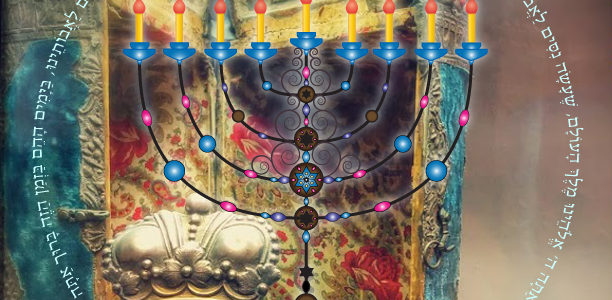

Dr. Aušra Pažėraitė
The Talmud (Shabbat 21b) speaks rather laconically of the origins of this holiday:
“Kislev 25, the days of Hanukkah which are eight, there is no mourning, there is no fasting during these days. When the Greeks came into the Temple, they polluted all the oil in the Temple, and when the Hasmonean dynasty overcame and defeated them, they checked [the Temple] and found just one jug of oil, which was in its place, and was sealed with the seal of the High Priest. But in it there was oil [only sufficient] for burning for just one day. A miracle occurred in connection with it: it burned for eight days. The next year they established them [these days] as holy days for giving glory (hallel) and thanks.”
The retelling isn’t as comprehensive as found in the Christian Bible where the two Books of the Maccabees written in Greek are found. They tell a longer story of Jewish persecution during the reign of the Hellenistic king of Syria Antiochus Epiphanes, the Jewish revolt under the brothers Maccabee and their victory. The Greek telling is full of rhetorical details speaking to how widespread Greek culture had taken root throughout the nation, even among the priesthood of the Temple in Jerusalem: “Now such was the height of Greek fashions, and increase of heathenish manners, through the exceeding profaneness of Jason, that ungodly wretch, and no high priest; That the priests had no courage to serve any more at the altar, but despising the temple, and neglecting the sacrifices, hastened to be partakers of the unlawful allowance in the place of exercise, after the game of Discus called them forth; Not setting by the honors of their fathers, but liking the glory of the Grecians best of all” (2 Maccabees 4:13-15). Athletics were practiced in the nude, and so displayed the evidence of circumcision, which caused shame, since it didn’t fit with the Greek ideal of manly virtue, kalokagathia. It tells how the Temple was looted and desecrated, and renamed Jupiter Olympus. Demands by the “Greek” regime to violate the Torah are also enumerated, and the story of the martyrs who refused to do so is provided. Many of the details of the stories are unclear to historians, but a general picture of the times is more or less provided. And this includes not just the brutal actions of the Hellenistic regime, but also the attraction and endless temptation Hellenistic thought and the Hellenistic lifestyle exerted.
Rav Aharon Lichtenstein defined the difference between Judaism and Hellenism, saying Judaism rejects worship of beauty and seeks the beauty of worship, whereas aesthetics were the most important consideration for Greeks even in their elaborate ethical systems. Beauty, thinking based on reasoned argument, the art of rhetoric, love of wisdom, explicating the laws by which nature operates, the emphasis on the powers and potentials of the human being both in naming man as the measure of all things and the deification of man in the religious cults–all of this was a great temptation luring in a large portion of the Jews of Israel in that period. A huge Jewish exile community formed in and around Alexandria in Egypt who no longer used or knew Hebrew or Aramaic, having adopted Hellenistic culture and even having translated the Torah to Greek…
The authors of the Books of the Maccabees written in Greek didn’t showcase the miracle of the oil; they didn’t even mention it. For them the important matter was the battle itself, the recovery of the Temple and its reconsecration. It seems as if the difference in the two accounts by the Greeks and the Talmudic sages aren’t that significant and they could be viewed as complementary, but the difference is very stark from the perspective of the Talmudists, especially having in mind the midrash which interprets the verse in the Book of Genesis about the beginning of the creation of the world, “And the earth was without form, and void; and darkness was upon the face of the deep.” The midrash commentary says (paraphrased):
“R. Shim’on ben Lakish applied these words to those in exile [in Diaspora]: ‘And the world was without form (tohu): this is the exile to Babylon: ‘I beheld the earth, and, lo, it was without form,..’ (Jeremiah 4:23); ‘and void’ (and vohu): this is the exile in Persia: ‘and hasted to bring (va-yavhillu) Haman…’ (Esther 6:14); ‘and darkness…’ is the Greek exile which blinded Israel’s eyes with its edicts, ordering Israel: ‘Write on the horn of the ox that you have no portion in the God of Israel’; ‘…upon the face of the deep…’: this is the Kingdom of evil, and how there is no fill for the endless depths, how there is no fill for this Kingdom of evil [for stuffing and stopping up the depths of evil]” (Midrash rabba 2:4).”
These four exiles (galuyot, diasporas), as interpreted by the MaHaRal of Prague in the 16th century, were the four beasts seen in Daniel’s vision (chapter 7): the first like a lion with the wings of the eagle, the second like a bear, the third like a leopard who had four wings and four heads and the fourth a beast like nothing else with iron teeth trampling everything underfoot. In all commentaries the fourth beast is the fourth exile for which, as with the bottomless pit, no end was seen, called the exile of Edom (Rome). In the MaHaRal’s exegesis exile is to be understood not just and not necessarily as physical exile from native lands. Exile is rather the domination of foreign powers which exiles the Torah, the power and beauty of Torah. The Greek exile is described in the midrash as “darkening the eyes of Israel” and as demanding renunciation of the Torah (“portion in God”). Commentators explain writing on the horn of an ox might mean a public act of renunciation. Perhaps this is the reason for the main injunction indicated by the sages: the public lighting of a light (optimally outside, at the entrance to the home, but allowed on the windowsill as well where it would be seen from outside, and only in cases of danger to be lit in concealment), which is meant to testify to the light of the Torah, which burns more purely the longer the night.
Aušra Pažėraitė

